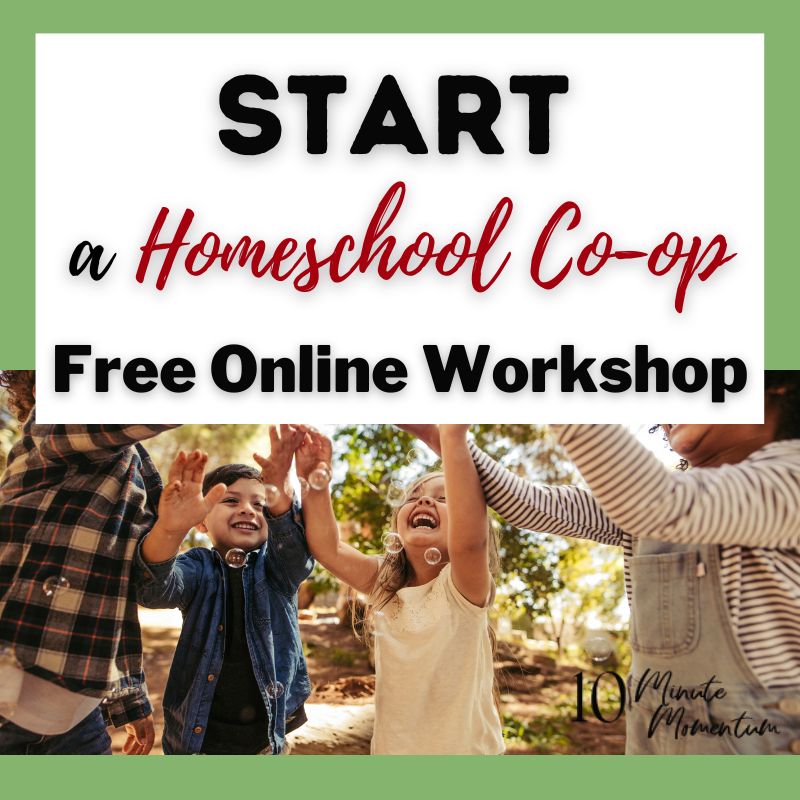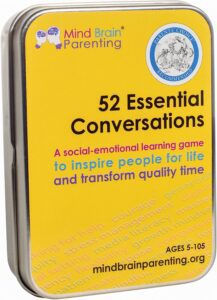Last Updated on March 26, 2024 by Sarah McCubbin
(Links on this page may be affiliate links. If you purchase through a link, we may earn a commission. Dislaimer Here)
As a leader in homeschool group, one of the challenges we have faced every year is how to help moms who are busy or overwhelmed figure out ways to contribute by teaching a class. Of course not everyone in the group needs to teach…some help by volunteering other ways like planning a field trip or doing admin tasks.
When I had a houseful of little kids, I often found myself volunteering to teach classes. Some of them were HARD…and some were surprisingly EASY. And over the years, I noticed that others felt the same way. Sometimes they were just SO HARD and sometimes it was almost effortless.
I started paying attention. Often the first time someone teaches a class becomes the baseline for whether they feel like they can do it again!
Quick Tip: The easiest classes to teach are those that align with your natural interests or professional expertise.
They require the least prep and feel the easiest to teach naturally!
Whether you’re a homeschool mom, a college student looking to enhance your college experience or a professional eyeing a guest-speaking gig, there’s an effortless way to make teaching part of your journey. Let’s dive into how your passions can translate into easy classes that you and your students will enjoy!
Table of Contents
Teach Your Hobbies and Interests to Others!
Your personal interests and hobbies are a treasure trove of teaching opportunities. Are you an avid reader of graphic novels or an enthusiast of creative writing? These subjects make for easy classes that engage students and require minimal prep on your part. The natural enthusiasm you have for your interests can turn an English class or a creative writing workshop into one of the easiest college classes, filled with lively discussions and impactful learning moments.
Perhaps you enjoy eating healthy, gardening or foods from different cultures. Use YOUR interest to create the foundation for an engaging class that everyone loves.
When you teach based on your interests, the prep is much quicker.
I find that this type of class usually starts with a quick outline based on the number of class needed. I pencil in a few ideas and then almost effortlessly gather supplies or materials to teach the class as I think about the class during the week. I usually teach an interest based class with a loose outline and nothing more.
If worksheets or other resources are needed, save valuable time by purchasing premade content from Teachers Pay Teachers or Etsy! Use that content as part of your outline and build the class with the resources that you probably have at home (if its based on your interests.)


Teach Your Professional Expertise With a Twist
It can be easy to believe that the topics we are “experts” in are things that others will know a lot about. Of course this isn’t true! Take a minute to pause and think about all the topics related to your education or profession that “someone” would consider you to have expertise in. You don’t have to know everything to have a topic worth teaching!
For example: I have a B.A. in English. Most of my work experience centers on teaching, working online or writing. Using that education and work background, I am comfortable teaching classes on writing, speech, blogging, social media, various tech, preparing for college, life skills and SO MUCH MORE. I think I need to make a list…I think it would be long.
If someone is a a nurse with a nursing degree, they might say they could teach a health class. But they actually have tons of other experiences to draw on. They might teach about healthy eating, anatomy, first aid, self advocacy, natural remedies, herbs, research, collaboration and more!
If your education lies in the arts, whether it’s film theory, film studies, film history, or art history, (even if you don’t use it professionally) these areas offer some of the easiest humanities courses to teach.
The key to teaching an interesting class is to take the content from your expertise and make it interesting and relevant to the students you have…whether they are in 5th grade or in college!! That is is the “twist.” You have to bring the content that you know and love to others at a level that is engaging to them right now.
Teaching Tips For Easy Classes
- The easiest courses are those where you teach what you know
- The hardest classes are ones that will require YOU learning a lot of new information or creating curriculum
- Use a Powerpoint presentation to create content you will teach over and over
- Ask guest speakers to come to your class
- Use outside resources from Teachers Pay Teachers or Etsy to speed up your prep time
- Make challenging classes and difficult classes easier by breaking down big concepts into several small lessons
- Outline your class quickly by using the class schedule to quickly make a list of the main topics you want to cover over the number of times you meet
- Find ways for students to “teach” part of the content to the class…its less prep and students learn what they need to teach
- Create a grading scale that is based on participation (if possible) and not detailed grading of assignments


40 Easy Classes for Elementary, Middle and High School
For parents and teachers leading classes for elementary, middle or high school age students, below are a variety of class ideas that CAN be easy to teach if they align with your interests, hobbies or professional or work expertise. Oftentimes teachers are required to teach classes that align with general education requirements. I get that. But even required classes can be easier to teach if you align them to make them relevant to everyday life.
Oftentimes students say that, “school is boring” but what they really mean is that it doesn’t feel relavant. For example, if you can take a required subject like English classes and you can have students read books about topics relevant to their lives….or write not just papers…but sample advertisements, social media posts or website copy…then it will feel more relevant because its something they see and use every day. The nature of human behavior is that we engage with our learning much more if it is something interesting and relevant.
Elementary School Electives
- Introduction to Drawing and Painting
- Basic Gardening and Plant Science
- Simple Cooking and Nutrition
- Storytelling and Creative Writing
- Fun with Physical Fitness
- Music Appreciation and Basic Instruments
- Exploring Local History
- Basic Computer Skills and Internet Safety
- Introduction to Chess and Board Games
- Crafts and DIY Projects
Middle School Electives
- Digital Art and Graphic Design
- Podcasting and Basic Audio Editing
- Environmental Club and Recycling Projects
- Robotics and Simple Coding
- Theater Arts and Improvisation
- Creative Writing and Blogging
- World Cultures and Languages
- Public Speaking and Debate
- Photography and Videography Basics
- Yoga and Mindfulness
High School Electives
- Film Studies and Analysis
- Entrepreneurship and Business Basics
- Fashion Design and Textile Arts
- Advanced Gardening: Hydroponics and Sustainability
- Culinary Arts: From Farm to Table
- Creative Writing: Genres and Techniques
- Music Production and Sound Engineering
- Sports and Society
- Graphic Novels and Literature
- Mobile App Development
Electives Suitable for Both Middle and High School
- Art History: Movements and Masterpieces
- Personal Finance and Investment Basics
- Community Service and Leadership
- Astronomy and Space Exploration
- Physical Education: Team Sports and Individual Fitness
- Forensic Science and Mystery Solving
- Animation and 3D Modeling
- Journalism and School Newspaper
- Web Design and Online Content Creation
- Animal Care and Veterinary Science
Easy Classes Beyond School
Outside the elementary, middle and high school, these same ideas for easy classes can be applied in many different environments. Whether you are teaching a college class, in graduate school or at a community college, you can take your content and create easy college classes (many times but not always…Calc 3 anyone!!) by taking it and making it connect to real life.
40+ Top Easy and Fun Classes for Teachers to Teach
One of the greatest challenges for students and teachers is balancing the work load and finding easy classes. Every class can not be hard and demanding (either to prepare or take). But every class should be engaging and interesting to learn.
As a leader in homeschool group, one of the challenges we have faced every year is how to help moms who are busy or overwhelmed figure out ways to contribute by teaching a class. Of course not everyone in the group needs to teach…some help by volunteering other ways like planning a field trip or doing admin tasks.
When I had a houseful of little kids, I often found myself volunteering to teach classes. Some of them were HARD…and some were surprisingly EASY. And over the years, I noticed that others felt the same way. Sometimes they were just SO HARD and sometimes it was almost effortless.
I started paying attention. Often the first time someone teaches a class becomes the baseline for whether they feel like they can do it again!
Quick Tip: The easiest classes to teach are those that align with your natural interests or professional expertise.
They require the least prep and feel the easiest to teach naturally!
Whether you’re a homeschool mom, a college student looking to enhance your college experience or a professional eyeing a guest-speaking gig, there’s an effortless way to make teaching part of your journey. Let’s dive into how your passions can translate into easy classes that you and your students will enjoy!
Teach Your Hobbies and Interests to Others!
Your personal interests and hobbies are a treasure trove of teaching opportunities. Are you an avid reader of graphic novels or an enthusiast of creative writing? These subjects make for easy classes that engage students and require minimal prep on your part. The natural enthusiasm you have for your interests can turn an English class or a creative writing workshop into one of the easiest college classes, filled with lively discussions and impactful learning moments.
Perhaps you enjoy eating healthy, gardening or foods from different cultures. Use YOUR interest to create the foundation for an engaging class that everyone loves.
When you teach based on your interests, the prep is much quicker.
I find that this type of class usually starts with a quick outline based on the number of class needed. I pencil in a few ideas and then almost effortlessly gather supplies or materials to teach the class as I think about the class during the week. I usually teach an interest based class with a loose outline and nothing more.
If worksheets or other resources are needed, save valuable time by purchasing premade content from Teachers Pay Teachers or Etsy! Use that content as part of your outline and build the class with the resources that you probably have at home (if its based on your interests.)


Teach Your Professional Expertise With a Twist
It can be easy to believe that the topics we are “experts” in are things that others will know a lot about. Of course this isn’t true! Take a minute to pause and think about all the topics related to your education or profession that “someone” would consider you to have expertise in. You don’t have to know everything to have a topic worth teaching!
For example: I have a B.A. in English. Most of my work experience centers on teaching, working online or writing. Using that education and work background, I am comfortable teaching classes on writing, speech, blogging, social media, various tech, preparing for college, life skills and SO MUCH MORE. I think I need to make a list…I think it would be long.
If someone is a a nurse with a nursing degree, they might say they could teach a health class. But they actually have tons of other experiences to draw on. They might teach about healthy eating, anatomy, first aid, self advocacy, natural remedies, herbs, research, collaboration and more!
If your education lies in the arts, whether it’s film theory, film studies, film history, or art history, (even if you don’t use it professionally) these areas offer some of the easiest humanities courses to teach.
The key to teaching an interesting class is to take the content from your expertise and make it interesting and relevant to the students you have…whether they are in 5th grade or in college!! That is is the “twist.” You have to bring the content that you know and love to others at a level that is engaging to them right now.
Teaching Tips For Easy Classes
- The easiest courses are those where you teach what you know
- The hardest classes are ones that will require YOU learning a lot of new information or creating curriculum
- Use a Powerpoint presentation to create content you will teach over and over
- Ask guest speakers to come to your class
- Use outside resources from Teachers Pay Teachers or Etsy to speed up your prep time
- Make challenging classes and difficult classes easier by breaking down big concepts into several small lessons
- Outline your class quickly by using the class schedule to quickly make a list of the main topics you want to cover over the number of times you meet
- Find ways for students to “teach” part of the content to the class…its less prep and students learn what they need to teach
- Create a grading scale that is based on participation (if possible) and not detailed grading of assignments
40 Easy Classes for Elementary, Middle and High School
For parents and teachers leading classes for elementary, middle or high school age students, below are a variety of class ideas that CAN be easy to teach if they align with your interests, hobbies or professional or work expertise. Oftentimes teachers are required to teach classes that align with general education requirements. I get that. But even required classes can be easier to teach if you align them to make them relevant to everyday life.
Oftentimes students say that, “school is boring” but what they really mean is that it doesn’t feel relavant. For example, if you can take a required subject like English classes and you can have students read books about topics relevant to their lives….or write not just papers…but sample advertisements, social media posts or website copy…then it will feel more relevant because its something they see and use every day. The nature of human behavior is that we engage with our learning much more if it is something interesting and relevant.
Best Social Skills Books & Tools
Elementary School Electives
- Introduction to Drawing and Painting
- Basic Gardening and Plant Science
- Simple Cooking and Nutrition
- Storytelling and Creative Writing
- Fun with Physical Fitness
- Music Appreciation and Basic Instruments
- Exploring Local History
- Basic Computer Skills and Internet Safety
- Introduction to Chess and Board Games
- Crafts and DIY Projects
Middle School Electives
- Digital Art and Graphic Design
- Podcasting and Basic Audio Editing
- Environmental Club and Recycling Projects
- Robotics and Simple Coding
- Theater Arts and Improvisation
- Creative Writing and Blogging
- World Cultures and Languages
- Public Speaking and Debate
- Photography and Videography Basics
- Yoga and Mindfulness
High School Electives
- Film Studies and Analysis
- Entrepreneurship and Business Basics
- Fashion Design and Textile Arts
- Advanced Gardening: Hydroponics and Sustainability
- Culinary Arts: From Farm to Table
- Creative Writing: Genres and Techniques
- Music Production and Sound Engineering
- Sports and Society
- Graphic Novels and Literature
- Mobile App Development
Electives Suitable for Both Middle and High School
- Art History: Movements and Masterpieces
- Personal Finance and Investment Basics
- Community Service and Leadership
- Astronomy and Space Exploration
- Physical Education: Team Sports and Individual Fitness
- Forensic Science and Mystery Solving
- Animation and 3D Modeling
- Journalism and School Newspaper
- Web Design and Online Content Creation
- Animal Care and Veterinary Science
Easy Classes Beyond School
Outside the elementary, middle and high school, these same ideas for easy classes can be applied in many different environments. Whether you are teaching a college class, in graduate school or at a community college, you can take your content and create easy college classes (many times but not always…Calc 3 anyone!!) by taking it and making it connect to real life.


Sarah McCubbin, founder of Ten Minute Momentum, is dedicated to helping parents confidently parent their kids by teaching life skills, social skills and leadership skills. As a child she was the kid that never quite fit in and is on a mission to help others understand the building blocks we all need to be successful adults. She lives in Ohio with her husband Mike, and 9 kids ranging in age from 5 to 21 where they use homeschool, private school and public schools for their kids education!
More Reading:










